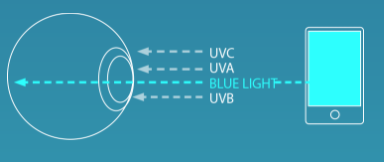The Best Indoor Lighting for Eye Health
How Your Home Setup Affects Vision Ever catch yourself rubbing your eyes after a few hours under harsh ceiling lights? Or maybe you’ve found...

If you find yourself wincing or instinctively shielding your eyes from bright lights, you may be experiencing photophobia, a condition characterized by heightened sensitivity to light. This discomfort can be triggered by a range of light sources, including sunlight, fluorescent lights, and traditional incandescent bulbs. While photophobia isn't a standalone eye disorder, it can serve as a warning sign of underlying issues such as infections, inflammation, or recent eye surgeries like LASIK.
Individuals with lighter-colored eyes, such as those with shades of blue, green, or gray, are particularly susceptible to photophobia due to their lower levels of melanin in the iris. This lack of pigmentation leaves their eyes more vulnerable to the sun's harsh glare and can lead to increased discomfort in bright lighting conditions. Moreover, individuals with albinism, a genetic condition that results in a complete absence of melanin, experience even greater sensitivity to light. In these cases, the eye's natural protection mechanisms are severely compromised, making it essential for individuals with albinism to take extra precautions to shield their eyes from intense light sources.
In addition to protective eyewear, there are various other strategies that can help manage photophobia and alleviate discomfort in bright light conditions. Creating a conducive environment by adjusting the lighting in your home or workspace can make a significant difference. Opt for softer, indirect lighting and minimize exposure to harsh fluorescent lights whenever possible. Installing window treatments like blinds or curtains can also help regulate the amount of natural light entering a room.
Furthermore, practicing good eye hygiene by taking regular breaks from screens, staying hydrated, and getting an adequate amount of rest can contribute to reducing light sensitivity. Incorporating foods rich in antioxidants and omega-3 fatty acids into your diet can also support eye health and potentially lessen the impact of photophobia.
Ultimately, addressing photophobia involves a holistic approach that considers both the physical and environmental factors contributing to light sensitivity. By implementing a combination of protective measures, lifestyle adjustments, and seeking professional guidance, individuals can effectively manage photophobia and improve their overall eye health and well-being.
If you're currently grappling with photophobia, it's crucial to schedule a consultation with your eye doctor promptly. By collaborating with your healthcare provider, you can pinpoint and address the underlying factors contributing to your light sensitivity, ultimately enhancing your vision and overall quality of life.

How Your Home Setup Affects Vision Ever catch yourself rubbing your eyes after a few hours under harsh ceiling lights? Or maybe you’ve found...

Did you know... The lens in a human eye doesn't filter blue light until around age 40 The closer a digital device is to your eyes, the greater the...

At the Rochester Eye & Laser Center, we’ve always believed in gratitude. We want to take a moment to share our sincere appreciation with our...